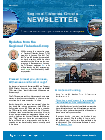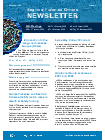Regional Fisheries Groups
Regional Fisheries Groups (RFGs) are a mechanismway for predominantly the inshore fishing fleetindustry to sharecome theirtogether views with Defra, MMO, Cefas, IFCA and other relevant parties to contributeshare toviews discussionswith onorganisations collaborativesuch working.as Theythe haveMMO, inDefra, partCefas, evolved from Quota Advisory Groups (QAGs) and stillIFCA. incorporate a quota discussion on catch limits. Below you can find notes from recent meetings and dates of forth coming meetings relevant to each region.
There are five Regional Fisheries Groups:
Below you can find more information on RFG’s, including the dates of our next meetings and the notes from previous meetings, relevant to each region.
Contact Details
If you would like to attend a Regional Fisheries Group meeting, comment on previous minutes or contribute in any other way please contact the MMO Regional fisheries Mailbox: regionalfisheriesgroups@marinemanagement.org.uk
Newsletter
Summer 2023 edition
Winter 2022 edition
Autumn 2022 edition
BackgroundWhere did RFGs originate?
InThese Decembergroups 2020,exist Defrato andgive MMOlocal hostedfishers a workshopchance forto be part of the inshoredecision-making fishingprocess fleetfor designedmanaging tofisheries focusand discussionshare ontheir howexpertise.
In together,December through2020, communicationDefra and action,the weMMO canorganised produce a modelworkshop for collaborativethe workinginshore tofishing addressfleet. regionallyThe specificaim issues.
Outcomesof from the workshop resultedwas into thefoster creationcollaborative ofworking Regionaland Fisheriesaddress Groups,regionally discussionspecific focusedissues.
Participants onat the intentionworkshop ofdiscussed crosscross-sector sector working, identifyingidentified prioritiespriorities, and thoughtsshared ontheir the preferences offor local areas. OverallBy the end of the meeting, there was agreement on the concept of Regional Fisheries Groups and the approach was reached.approach.
The
Aim incentiveof forthe theseRFGs
Our groupsaim aroseis asto angive outputa fromformal theroute Futurefor offishers Inshoreto Fisheriesshare Conference,their views and conversationsexperience heldin duringdecisions Defra’saffecting Inshoretheir Workinglivelihoods. GroupWe andwant theto MMO’sbuild Quotastronger Advisoryworking Groups.
Concept
Torelationshipsgeneratebetweenapeopleculturalwhoshiftregulatethattheenablestoandbecomepartofdecision-makingfishingprocesscommunity.forByfisheriesdoingmanagement,this,recognisingeveryonethatinvolvedindustry,ingovernmentfisheriesandmanagementthecanrecreationalsectorsharedbettervestedunderstandinginterestofinthedevelopingchallenges andmaintainingopportunitiesafacedworld-classbysustainablethefisheriesfishingmanagementindustrysystemregionally.RFGs
thatwillsupportsdolocalthiscommunities.
Approachby…
ToProvidinggiveindustrymoreofanactiveroleinregionaldecisionmakingandprovideanopportunityforthemtoinfluenceregionalfisheriesdecisions.Toprovidefishermenfishers and others who may feel they are not represented by a wider national group.ToBuildingbuildregulatorsregulators, and the fishing sector at a regional level, and recognising the knowledgethatToGivingbetterindustryunderstandantheactivechallengesrole in regional fisheries management decision making andopportunitiesprovidefacingantheopportunityindustryforatthemato influence regionalleveldecisions.- Working
(particularlytogetherthetoinshorebettersector)understandsinceUKchallengeshasandbecomeopportunitiesanfacingindependentthecoastalindustrystate,at a regional level so the government can help them to take advantage of opportunities for the future of the industry.
The
Engagement
- Formal
RegionalmeetingsFisheriesareGroupsheldpresentuprealtoopportunitiesthreefortimescollaborativeaworkingyear. - The
onRFGateamrangevisitofportsissues,andfromfishingFisherieslocationsManagementinPlansperson encouraging one tomoreonelocalisedconversationscollaborativewithsciencefishers. - The
projectsRFGtoteamquotaismanagement.availableTheduringmembershiptheencompassesworkingMMO,hoursDefra,ofCefas,9amIFCAs,-the5pmcatchingMondaysectortoandFridayothertorelevantanswerstakeholders.
or emails.Regionalcalls,FisheriestextsGroups:
NorthIfEastyou’re-interested4bSouthinWestany-other7efgway, contact the team at: regionalfisheriesgroups@marinemanagement.org.uk
Lyme Bay Code of Conduct
The Marine Management Organisation (MMO) has responded to concerns from fishermen that an increase in sole quota has led to conflict and potentially overfishing in Lyme Bay.
The MMO and Inshore Fisheries Conservation Authorities (IFCA) have been investigating the issue and have created a steering group to oversee the investigation. The Steering group includes representative fishers from the Lyme Bay Community Interest Company, and other ports outside of Lyme Bay, as well as the Department for Environment, Food and Rural Affairs (Defra), IFCA, Centre for Environment, Fisheries and Aquaculture (Cefas) and MMO representatives.
At a recent steering group meeting, a best practice Code of Conduct for sole fishing with gill nets in Lyme Bay was agreed as follows.follows:
Note: Lyme(This Baycode isof definedconduct asapplies to the area defined inside a line from Beer Head to Portland.Portland)
- A minimum mesh size 5 inches (127mm) for gill nets targeting sole.
- All fixed nets should be marked with a buoy showing the PLN of the vessel at both ends of the net.
- Flags and radar reflectors are used where possible and practical to mark the location of nets.
Note: That these are best practice recommendations and not law.
- The first recommendation is to support the sole population by letting smaller soles increase their opportunity to breed.
- The second is to help prevent gear conflict by increasing the visibility of net locations to prevent them being
caughttowedupthatcrosssetinthewater.TheMMOisworkingwithCefasandotherorganisationstodevelopascientificinvestigationintowhatimpactincreasedfishinginLymeBaymaybehavingonsolepopulations,themarineenvironment,andthepotentialsocio-economicimpactsonfishers.ThisworkinvolvestheuseofMMOdatafromlogbooks,theCatchAppandfromobserversatseaandinfishmarkets,toanalysecatchesmadebydifferentvesselsaswellasotherpossibleworktolookatthewidersolepopulation.LymeBay-SocialFindings
Additional Information
Useful links
-
Catch Recording – 0300 0203 788
-
IVMS – 01900 508618
-
Fishing Vessel Licensing - fishingvessellicensing@marinemanagement.org.uk
-
Monthly catch limits - InshoreQuotaManager@marinemanagement.org.uk
-
Funding – 0208 026 5539
The MMO is working with Cefas and other organisations to develop a scientific investigation into the impacts increased fishing in Lyme Bay is having on sole populations, the marine environment, and the potential socio-economic impacts on fishers. This work involves the use of MMO data from logbooks, the Catch App and from observers, to analyse catches as well as other possible work to look at the wider sole population.
Last updated
-
Update of page content to improve quality of information and accessibility .
-
RFG Newsletter Winter 2022 published.
-
Lyme Bay Social Findings
-
Regional Fisheries Groups Winter 2022 Newsletter published.
-
Update with meet the team
-
Code of Conduct - update
-
Updated
-
Page updated with 4b & 7a meeting notes
-
updated RFG group minutes
-
South Update
-
Page updated with RFG Meeting Notes North East 16.11.2021
-
NW notes
-
Update
-
Update
-
First published.
Update history
2024-12-31 16:14
Update 2025
2024-03-14 16:51
Video added of what are regional fisheries groups
2024-02-09 08:46
RFG Newsletters Winter 2024 editions published.
2023-12-01 12:50
Linked to winter edition newsletters added.
2023-07-25 15:37
Added anonymous reporting form
2023-06-30 11:08
Update of page content to improve quality of information and accessibility.
2023-03-08 11:35
RFG Newsletter Winter 2022 published.
2023-01-04 14:46
Lyme Bay Social Findings
2022-12-15 16:58
Regional Fisheries Groups Winter 2022 Newsletter published.
2022-10-27 10:04
Update with meet the team
2022-10-10 15:35
Code of Conduct – update
2022-07-12 15:23
Updated
2022-03-21 17:29
Page updated with 4b & 7a meeting notes


